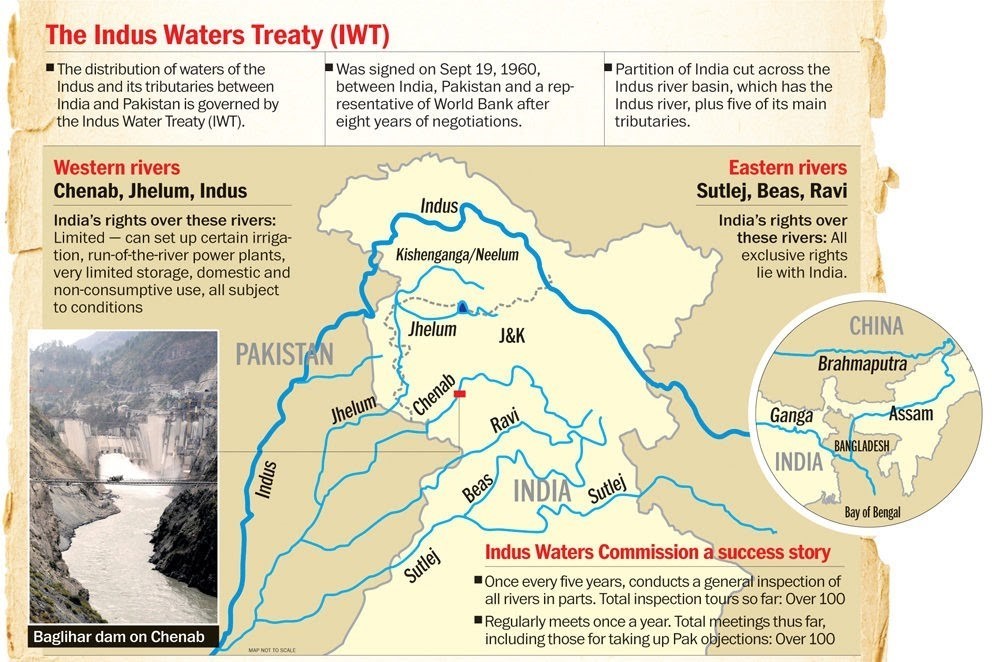INDUS WATERS: INDIA FREEZES TALKS WITH PAKISTAN

- 20 Sep 2024
In News:
India has decided to halt all meetings of the Permanent Indus Commission (PIC) until both governments engage in discussions to renegotiate the Indus Waters Treaty (IWT), a decision communicated by a senior official. The last PIC meeting occurred in May 2022, and since January 2023, India has made four attempts to initiate talks with Pakistan, but these efforts have not received satisfactory responses.
The IWT, established in 1960 with the mediation of the World Bank, governs the sharing of six rivers between India and Pakistan. Under this treaty, India controls the waters of the Ravi, Sutlej, and Beas rivers, while Pakistan has rights to the Sindh, Jhelum, and Chenab rivers. The treaty mandates annual meetings of the PIC, which have continued despite ongoing conflicts between the two nations. However, India’s recent push for renegotiation threatens the stability of this long-standing arrangement.
India's Notice for Review of the Indus Waters Treaty
India formally issued a notice to Pakistan on August 30, 2023, seeking modifications to the IWT, citing "fundamental and unforeseen changes" that necessitate a reassessment of the agreement. This is not an isolated instance; India had previously requested a review in January 2023, attributing the need for change to Pakistan’s persistent intransigence regarding its obligations under the treaty.
Key reasons for India’s demand include:
- Changes in population demographics and environmental challenges.
- The necessity for clean energy development to meet emissions targets.
- The impact of ongoing cross-border terrorism, which India argues affects water management and security.
The notification highlights issues related to two contentious hydroelectric projects in Jammu & Kashmir—the Kishanganga and Ratle projects—over which Pakistan has raised objections, claiming they violate the IWT. India asserts that these projects are "run-of-the-river" schemes that do not significantly impede river flow.
Dispute Resolution Mechanisms Under the Treaty
The IWT outlines a structured dispute resolution mechanism, as detailed in Article IX. This mechanism involves three levels:
- First Level: Initial discussions occur at the PIC, where either party must inform the other of planned projects.
- Second Level: If differences remain unresolved, a Neutral Expert, appointed by the World Bank, is engaged to mediate.
- Third Level: Should the Neutral Expert fail to resolve the issue, the dispute escalates to the Court of Arbitration.
Historically, both countries have used these mechanisms, although recent years have seen significant contention. After a Pakistan-backed terror attack in Uri in 2016, India’s Prime Minister expressed the sentiment that “blood and water cannot flow together,” leading to the suspension of routine talks.
The World Bank has navigated a complex situation, receiving requests from both nations for adjudication on overlapping disputes. In December 2016, it paused these processes to encourage direct negotiations. Despite attempts to resume dialogue between 2017 and 2022, Pakistan’s reluctance to engage has further complicated matters.
Current Status and Future Implications
India’s formal notification and its call for renegotiation may set a precedent that challenges the existing framework of the IWT. The continuation of the PIC's activities hinges on a willingness from both governments to address these evolving concerns collaboratively. As tensions persist and environmental needs grow, the future of water-sharing arrangements in the region remains uncertain. The overarching goal for both nations will be to find a sustainable resolution that addresses emerging challenges while honoring the historical framework established by the IWT.
